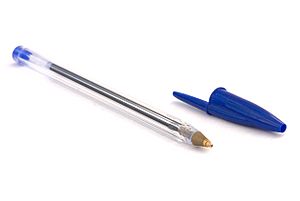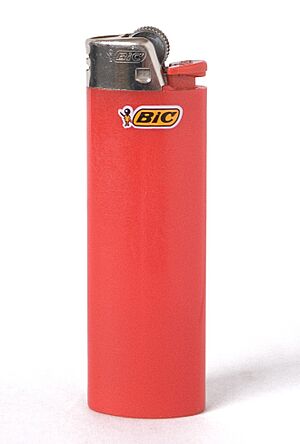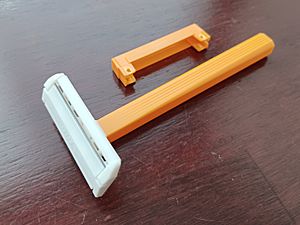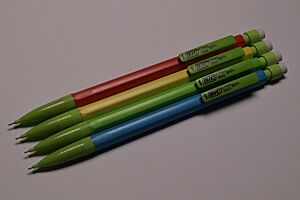Bic (company) facts for kids
 |
|
| Public | |
| Traded as | Euronext Paris: BB CAC Mid 60 Component |
| Industry | Manufacturing |
| Founded | 25 October 1945 |
| Founders |
|
| Headquarters |
,
France
|
|
Area served
|
Worldwide |
|
Key people
|
Gonzalve Bich (CEO) |
| Products | |
| Revenue | |
|
Operating income
|
|
| Total assets | |
| Total equity | |
| Owner | Bich family |
|
Number of employees
|
15,898 (2022) |
Société Bic S.A., usually called Bic, is a French company. It is known for making many everyday items. Bic was started in 1945 by Marcel Bich. The company makes things that are meant to be used and then replaced. These include pens, stationery, lighters, and shaving razors.
Contents
History of Bic
In 1942, Marcel Bich and his partner, Édouard Buffard, started a business. They made parts for writing tools in a factory near Paris, France. They soon began making pen holders and pencil cases.
The Bic Cristal Pen
Marcel Bich bought the idea for the ballpoint pen from an inventor named László Bíró. Bich then used tools like those used for making watches to create a way to make tiny stainless-steel balls for the pen tips. He made the ballpoint pen design even better. In 1950, the Bic Cristal ballpoint pen became the company's first product. Since then, over one hundred billion Bic Cristal pens have been sold. It is still the best-selling pen in the world.
Growing Around the World
Bic officially became "Société Bic" in 1953. The company's shares were first sold on the Paris Stock Exchange in 1972. Between 1950 and the 1970s, Bic grew into many countries. These included Italy, Brazil, the United Kingdom, Australia, and the United States. In 1958, Bic bought the American Waterman Pen Company. This helped Bic become well-known in the U.S.
New Products and Ideas
In 1969, Bic started its advertising in the United States. A year later, the four-color Bic pen was launched. This pen allowed you to change ink colors without needing a new pen. Bic was able to make many pens at a low cost. This made their products affordable for everyone.
Over the years, Bic added more products. In 1979, they bought the Conté company, known for art supplies. In 1981, Bic started "BIC Sport," which made windsurfing boards. The "BIC Mini lighter" came out in 1985. In 1992, Bic bought Wite-Out Products, a brand of correction fluid. They then sold it as Bic Wite Out.
Bic Today
In the 2000s, Bic continued to grow. They launched BIC Sport kayaks and new razors like the BIC Comfort 3 and BIC Soleil. In 2018, Bic introduced temporary tattoo markers called BodyMark by BIC. In 2019, they launched "Made For You," a line of shaving products for everyone.
In 2020, Bic bought Rocketbook, a smart reusable notebook brand. This helped Bic combine traditional writing with digital tools. Bic also started making more eco-friendly products. In 2021, they launched the BIC ReVolution line. This line includes pens and pencils made from recycled plastic.
As of May 2021, Bic has over 25 factories worldwide. Their main office is in Clichy, France. Their U.S. office is in Shelton, Connecticut. In 2023, Bic launched EasyRinse, a new razor designed to prevent clogging.
Bic Products
Bic is famous for its simple, reliable, and affordable products.
Lighters
Bic lighters were first sold in 1973. They were designed to be disposable and last for about 3,000 lights. These lighters were made of plastic and came in a few colors. They were sold at a very low price. Bic makes about 750 million lighters each year at its factory in Redon, France.
Razors
Bic started making shaving products in the 1980s. In 1981, they also created Bic Sport, which made products for water sports. Bic sold Bic Sport to an Estonian company in 2019. Bic's shaving products have grown to include razors for women, like the Soleil brand, and razors with multiple blades, such as the Flex 5.
Pens
After getting the idea for ballpoint pens, Bic launched the Bic Cristal Pen. This pen is still one of the most successful pens ever made. Bic has tried to make many other types of ballpoint pens, but the Cristal remains a favorite.
Helping the Environment
Bic is working to be more environmentally friendly. In 2021, they launched the Bic ReVolution line of stationery. These products, like pens and mechanical pencils, are made using at least 50% recycled plastic. The packaging is also made from 100% recycled paperboard.
In 2022, Bic joined One Percent for the Planet. This group means that Bic gives at least one percent of its sales from the BIC ReVolution line to environmental groups. By 2025, Bic plans for all its packaging to be reusable, recyclable, or compostable. By 2030, Bic wants its products to contain 50% non-new plastic.
Who Owns Bic
The Bich family, who started the company, still owns a large part of Bic. They own about 46% of the company's shares. This gives them a lot of control over how the company is run.
Sponsorships
Bic has supported sports teams in the past. In the 1960s, Bic sponsored a professional cycling team. Famous riders like Jacques Anquetil and Luis Ocaña were on this team. Bic has also been an "official supporter" of the Tour de France cycling race since 2011. From 1997 to 2000, Bic also sponsored the Alain Prost racing team in Formula One.
Bic's Look
Logo
The Bic logo has two parts. There is a shape like a diamond with rounded corners. Inside it are the letters "BiC," with only the "i" being a small letter. To the left of this shape is the "Bic Boy." The Bic Boy is a drawing of a schoolboy with a head shaped like a ball. He is holding a pen behind his back. The ball head represents the tiny tungsten carbide ball in Bic's pens. The Bic Boy was designed in 1960 to help attract children. When the Bic Boy was added to the logo in 1961, both parts of the logo changed to the company's official orange color.
Images for kids
See also
 In Spanish: Bic para niños
In Spanish: Bic para niños
 | Percy Lavon Julian |
 | Katherine Johnson |
 | George Washington Carver |
 | Annie Easley |









